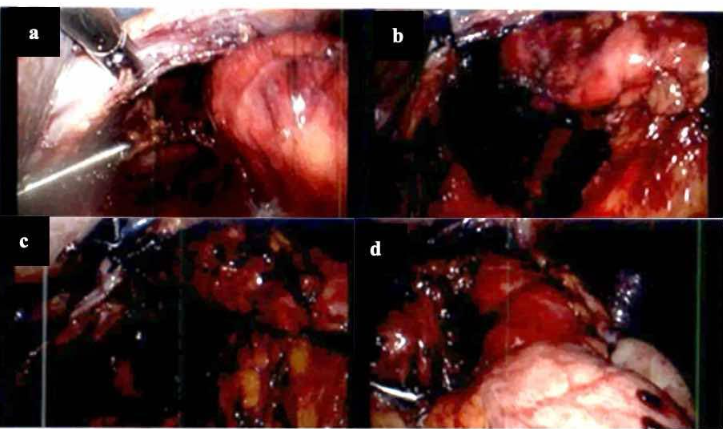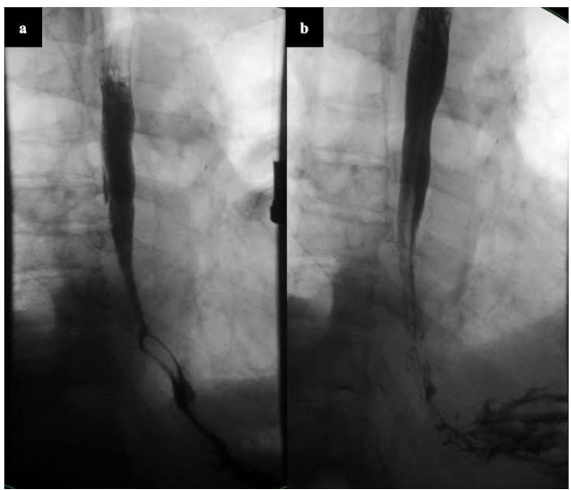Monday Poster Session
Category: Esophagus
P2894 - Effective Surgical Intervention for Refractory GERD-Associated Peptic Strictures in a Complex Case: A Novel Approach Using Toupet Fundoplication
Monday, October 27, 2025
10:30 AM - 4:00 PM PDT
Location: Exhibit Hall

Evelyn Inga, MD
University of New Mexico Health Sciences Center
Albuquerque, NM
Presenting Author(s)
Evelyn Inga, MD1, Gregory Grimberg, MD2
1University of New Mexico Health Sciences Center, Albuquerque, NM; 2Mercy One North Iowa, Mason City, IA
Introduction: Chronic severe reflux esophagitis can lead to complications such as fibrosis and peptic strictures, significantly impairing quality of life. While proton pump inhibitors (PPIs) and endoscopic dilation are first-line therapies, refractory strictures pose a clinical challenge. Surgical interventions, like laparoscopic fundoplication, remain underexplored. This report presents a surgical approach for managing refractory GERD-related peptic strictures, emphasizing its potential in complex cases.
Case Description/
Methods: A 79-year-old male with GERD, type 2 diabetes, chronic obstructive pulmonary disease, atrial fibrillation, chronic kidney disease, and prior surgeries for lung carcinoid and colon cancer presented with progressive dysphagia, weight loss, and GERD despite pharmacological and endoscopic interventions. Diagnostic workup, including esophagram, endoscopy, high-resolution manometry, and Bravo pH study, revealed refractory strictures, ineffective esophageal motility, a hiatal hernia, and significant acid reflux (DeMeester score: 101.0). After failed double-dose PPIs, Potassium-Competitive Acid Blocker (PCAB) and repeated endoscopic dilations, laparoscopic hiatal hernia repair with Toupet fundoplication was performed. Intraoperative functional luminal imaging probe (EndoFlip) confirmed adequate esophageal distensibility. Postoperative dysphagia was managed with dietary modifications. At three- and six-month follow-ups, the patient reported significant improvement in dysphagia, tolerance to solid foods, and reduced reflux episodes, with endoscopic confirmation of sustained improvement. At one year follow-up, he had regained weight, had no dysphagia, no GERD symptoms and no dietary restrictions.
Discussion: Refractory GERD-related peptic strictures often require alternative therapies beyond PPI's and dilatations. Laparoscopic antireflux surgery (LARS), particularly Toupet fundoplication, offers durable reflux control with a lower risk of postoperative dysphagia. This case demonstrates the efficacy of LARS in managing refractory strictures, supported by intraoperative EndoFlip assessment and postoperative symptom resolution. Recent studies suggest superior outcomes with surgical interventions compared to repeated dilations, highlighting the need for further research to integrate fundoplication into treatment algorithms for refractory cases. This report underscores the potential of surgical management in improving quality of life for patients with complex, refractory GERD-related strictures.

Figure: Figure 1: a) The barium swallow shows narrowing at the distal end of the esophagus, suggestive of an esophageal stricture. b) The same findings as Figure 1a are observed after endoscopic balloon dilatation.

Figure: Figure 2: Intraoperative details: a) Nearly complete dissection, b) Complete dissection of the esophagus exceeding 4 cm in the abdomen, c) Crural closure, d) Toupet fundoplication, posterior 270-degree wrap
Disclosures:
Evelyn Inga indicated no relevant financial relationships.
Gregory Grimberg indicated no relevant financial relationships.
Evelyn Inga, MD1, Gregory Grimberg, MD2. P2894 - Effective Surgical Intervention for Refractory GERD-Associated Peptic Strictures in a Complex
Case: A Novel Approach Using Toupet Fundoplication, ACG 2025 Annual Scientific Meeting Abstracts. Phoenix, AZ: American College of Gastroenterology.
1University of New Mexico Health Sciences Center, Albuquerque, NM; 2Mercy One North Iowa, Mason City, IA
Introduction: Chronic severe reflux esophagitis can lead to complications such as fibrosis and peptic strictures, significantly impairing quality of life. While proton pump inhibitors (PPIs) and endoscopic dilation are first-line therapies, refractory strictures pose a clinical challenge. Surgical interventions, like laparoscopic fundoplication, remain underexplored. This report presents a surgical approach for managing refractory GERD-related peptic strictures, emphasizing its potential in complex cases.
Case Description/
Methods: A 79-year-old male with GERD, type 2 diabetes, chronic obstructive pulmonary disease, atrial fibrillation, chronic kidney disease, and prior surgeries for lung carcinoid and colon cancer presented with progressive dysphagia, weight loss, and GERD despite pharmacological and endoscopic interventions. Diagnostic workup, including esophagram, endoscopy, high-resolution manometry, and Bravo pH study, revealed refractory strictures, ineffective esophageal motility, a hiatal hernia, and significant acid reflux (DeMeester score: 101.0). After failed double-dose PPIs, Potassium-Competitive Acid Blocker (PCAB) and repeated endoscopic dilations, laparoscopic hiatal hernia repair with Toupet fundoplication was performed. Intraoperative functional luminal imaging probe (EndoFlip) confirmed adequate esophageal distensibility. Postoperative dysphagia was managed with dietary modifications. At three- and six-month follow-ups, the patient reported significant improvement in dysphagia, tolerance to solid foods, and reduced reflux episodes, with endoscopic confirmation of sustained improvement. At one year follow-up, he had regained weight, had no dysphagia, no GERD symptoms and no dietary restrictions.
Discussion: Refractory GERD-related peptic strictures often require alternative therapies beyond PPI's and dilatations. Laparoscopic antireflux surgery (LARS), particularly Toupet fundoplication, offers durable reflux control with a lower risk of postoperative dysphagia. This case demonstrates the efficacy of LARS in managing refractory strictures, supported by intraoperative EndoFlip assessment and postoperative symptom resolution. Recent studies suggest superior outcomes with surgical interventions compared to repeated dilations, highlighting the need for further research to integrate fundoplication into treatment algorithms for refractory cases. This report underscores the potential of surgical management in improving quality of life for patients with complex, refractory GERD-related strictures.

Figure: Figure 1: a) The barium swallow shows narrowing at the distal end of the esophagus, suggestive of an esophageal stricture. b) The same findings as Figure 1a are observed after endoscopic balloon dilatation.

Figure: Figure 2: Intraoperative details: a) Nearly complete dissection, b) Complete dissection of the esophagus exceeding 4 cm in the abdomen, c) Crural closure, d) Toupet fundoplication, posterior 270-degree wrap
Disclosures:
Evelyn Inga indicated no relevant financial relationships.
Gregory Grimberg indicated no relevant financial relationships.
Evelyn Inga, MD1, Gregory Grimberg, MD2. P2894 - Effective Surgical Intervention for Refractory GERD-Associated Peptic Strictures in a Complex
Case: A Novel Approach Using Toupet Fundoplication, ACG 2025 Annual Scientific Meeting Abstracts. Phoenix, AZ: American College of Gastroenterology.
